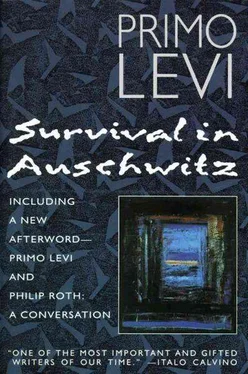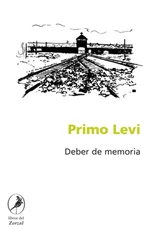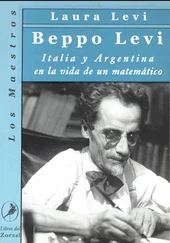When my turn comes I manage miraculously to take off my shoes and rags without losing any of them, without letting my bowl and gloves be stolen, without losing my balance and keeping my beret in my hand all the time, as for no reason can one wear it on entering a hut.
I leave the shoes at the deposit and am given the appropriate check, after which, barefoot and limping, my hands full of all my poor possessions that I dare not leave anywhere, I am admitted inside and join a new queue which ends in the examination rooms.
In this queue one progressively undresses so as to be naked when one arrives at the head, where a male nurse puts a thermometer under one’s arm-pit. If anyone is dressed he loses his turn and goes back to join the queue. Everybody has to be given the thermometer, even if he only has a skin disease or toothache. In this way they make sure that whoever is not seriously ill will not submit himself to this complicated ritual for the sake of caprice.
My turn Anally arrives and I am brought in front of the doctor. The nurse takes out the thermometer and presents me: ‘Nummer 174517, kein Fieber.’ I do not need a long examination: I am immediately declared Arztvormelder. What it means I do not know, but this is certainly not the place to ask questions. I find myself thrown out, I get back my shoes and go back to the hut.
Chajim rejoices with me: I have a good wound, it does not seem dangerous, but it should be enough to guarantee me a discreet period of rest. I will spend the night in the hut with the others, but tomorrow morning, instead of going to work, I will have to show myself to the doctors for the definitive examination : this is what Artzvormelder means. Chajim is experienced in these matters and he thinks that I will probably be admitted tomorrow to Ka-Be. Chajim is my bed-companion and I trust him blindly. He is Polish, a religious Jew, learned in rabbinical law. He is about as old as I, a watchmaker by profession, and here in Buna works as a precision mechanic; so he is among the few who are able to preserve their dignity and self-assurance through the practice of a profession in which they are skilled.
And so it happened. After the reveille and the bread they called me out with three others from my hut. They took us to a corner of the roll-call square where there was a long queue, all the Artzvormelder of today; someone came and took away my bowl, spoon, beret and gloves. The others laughed. Did I not know that I had to hide them or leave them with someone, or best of all sell them, as they cannot be taken in Ka-Be? Then they look at my number and shake their heads: any stupidity is to be expected from one with so high a number.
Then they counted us, they made us undress outside in the cold, they took our shoes, they counted us again, and they made us take a shower. Then an SS man came, he looked at us without interest, stopping in front of one with a large hydrocele, whom he placed apart. After which they counted us again and made us take another shower, although we were still wet from the first one and some were trembling from a chill.
We are now ready for the definitive examination. Outside the window one can see the white sky and sometimes the sun; in this country one can look at it fixedly, through the clouds, as through a misty window. To judge by its position it must be past 2 p.m. Good-bye soup by now, and we have been on our feet for ten hours and naked for six.
This second medical examination is also extraordinarily rapid: the doctor (he has a striped suit like us, but with a white coat over it, with the number sewn on the coat, and he is much fatter than us) looks at and touches my swollen and bloody foot, at which I cry out from pain. Then he says: ‘Aufgenommen, Block 23.’ I stand there with my mouth open, waiting for some other indication, but someone pulls me backwards brutally, throws a gown on my bare shoulders, gives me a pair of sandals and drives me out into the open.
A hundred yards away is Block 23; written on it is ‘Schonungsblock’. Who knows what it means? Inside they take off my gown and sandals and I find myself naked and last again in a queue of human skeletons — the inmates of today.
I have stopped trying to understand for a long time now. As far as I am concerned, I am by now so tired of standing on my wounded foot, still untended, so hungry and frozen, that nothing can interest me any more. This might easily be my last day and this room the gas chamber of which all speak, but what can I do about it? I might just as well lean against the wall, close my eyes and wait.
My neighbour cannot be Jewish. He is not circumcised and besides (this is one of the few things that I have so far learnt), so blond a skin, a face and a body so huge, are characteristics of non-Jewish Poles. He is a whole head taller than me but he has quite cordial features, as have only those who do not suffer from hunger.
I tried to ask him if he knew when they would let us enter. He turned to the nurse who resembled him like a twin and was smoking in the corner; they talked and laughed together without replying, as if I was not there. Then one of them took my arm and looked at my number and then both laughed still more strongly. Everyone knows that the 174000s are the Italian Jews, the well-known Italian Jews who arrived two months ago, all lawyers, all with degrees, who were more than a hundred and are now only forty; the ones who do not know how to work, and let their bread be stolen, and are slapped from the morning to the evening. The Germans call them ‘zwei linke Hände’ (two left hands), and even the Polish Jews despise them as they do not speak Yiddish.
The nurse points to my ribs to show the other, as if I was a corpse in an anatomy class: he alludes to my eyelids and my swollen cheeks and my thin neck, he stoops to press on my tibia with his thumb, and shows the other the deep impression that his finger leaves in the pale flesh, as if it was wax.
I wish I had never spoken to the Pole: I feel as if I had never in all my life undergone an affront worse than this. The nurse, meanwhile, seems to have finished his demonstration in his language which I do not understand and which sounds terrible. He turns to me, and in near-German, charitably, tells me the conclusion: ‘Du Jude, kaputt. Du schnell Krematorium fertig.’ (You Jew, finished. You soon ready for crematorium.)
Some more hours pass before all the inmates are seen, are given a shirt and their details taken. I, as usual, am the last. Someone in a brand-new striped suit asks me where I was born, what profession I practised ‘as a civilian’, if I had children, what diseases I had had, a whole series of questions. What use could they be? Is this a complicated rehearsal to make fools of us? Could this be the hospital? They make us stand naked and ask us questions.
Finally the door is opened, even for me, and I can enter the dormitory.
Here as everywhere there are bunks on three levels, in three rows throughout the hut, separated by two narrow corridors.
The bunks are 150, the patients 250; so there are two in almost all the bunks. The patients in the upper bunks, squashed against the ceiling, can hardly sit up; they lean out, curious to see the new arrivals of today. It is the most interesting moment of the day, for one always finds some acquaintances. I am assigned bunk number 10 — a miracle! It is empty! I stretch myself out with delight; it is the first time since I entered the camp that I have a bunk all to myself. Despite my hunger, within ten minutes I am asleep.
The life of Ka-Be is a life of limbo. The material discomforts are relatively few, apart from hunger and the inherent pains of illness. It is not cold, there is no work to do, and unless you commit some grave fault, you are not beaten.
Читать дальше












